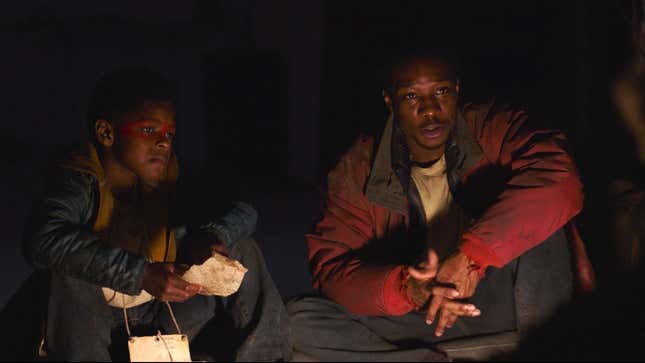
Episode five of HBO’s The Last of Us marks the midpoint of our nine-episode journey. That’s right, we’re halfway there, and Ellie and Joel are definitely living on a prayer. Look, I’m sorry for the bad Bon Jovi reference but man, this episode is The Last of Us at its most relentlessly bleak. I needed to do something to lighten the mood for myself, and unlike Ellie, I don’t have a book of awful jokes handy. At least this episode also features what I consider the most effective subtle nod to the game in the entire season. We’ll get to that in a bit.
At the end of episode four, Joel and Ellie were being held at gunpoint by two characters who players of the game likely immediately recognized as Henry and Sam. (If you need to catch up, you can find my recap of that episode here.) As episode five begins, we flash back a little while to meet these new characters and learn about what’s driven them into such desperate circumstances.
The Fall of Kansas City FEDRA
At first glance, this episode’s beginning seems like one of pure jubilation. Chants of “freedom!” are heard rising from a crowd that’s celebrating in the streets. But almost immediately, we’re shown the grim side of this happy occasion, with FEDRA officers being executed at point-blank or publicly hoisted into the air by the neck as they twitch with their final struggles for life. An armored vehicle the people have reclaimed roams the streets blasting the message, “Collaborators, surrender now and you will receive a fair trial.” Hmm, yes, somehow I don’t believe you. Maybe it’s the fact that you’re dragging a body behind you that’s stuffed with so many blades it looks like a pincushion, I’m not sure.
As the armored vehicle passes, we see Henry and Sam lurking in the shadows. Henry (Lamar Johnson, The Hate U Give) uses ASL to communicate with his brother, cluing us in to a significant change from the game: Here, Sam is deaf. (Sam is wonderfully played here by young actor Keivonn Woodard, who is also deaf.) In this brief exchange, you can already sense Henry trying to put on a brave face for his much younger brother. The two sneak away unseen by the patrolling resistance which, as we learned in last week’s episode, is hell-bent on finding them.
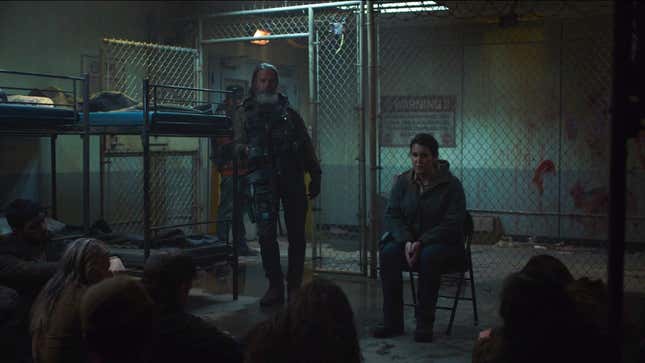
In fact, even as the celebration rages on, Kathleen (Melanie Lynskey), the resistance’s leader, is working, interrogating a group of “collaborators”—civilians who worked with FEDRA before it fell—about Henry’s whereabouts. Lynskey remains chilling in the role, coating her comments in a tone that, on the surface, sounds reasonable and kind, but is so transparently cold and ruthless underneath. “Lucky for you, I’m not FEDRA,” she tells them, saying that if they cooperate, they’ll be put on trial, be found guilty of course, and then have to do some time, “easy.” She’s got her commando assistant Perry (Jeffrey Pierce, who voices Joel’s brother Tommy in the games) by her side, his silent presence lending her words an added threat of danger. Finally someone cracks and tells her that Henry and Sam are with Edelstein, the doctor we saw Kathleen interrogate in last week’s episode.
A moment later, she orders her men to go door-to-door until her prey is found. When Perry shows some hesitation and advises against this plan, we see that she can turn her condescending ruthlessness on him, too. “He’s not my seventh priority, Perry,” she says. “Is that what he is to you?” I’m starting to feel like the way she prioritizes finding Henry above all other concerns may backfire on her in some way. Remember last week, when Perry showed her the ominous, quivering sinkhole in the building, and rather than dealing with it in any real way, she told him to just seal the building off and remain focused on finding Henry? Yeah, I’ve got a bad feeling about this.
Perry asks if they’re really putting the arrested collaborators on trial. Of course they’re not. “When you’re done, burn the bodies. It’s faster,” she says, the way you might ask someone to pick up some milk from the grocery store on the way home.
Henry and Sam stay with Edelstein
Henry and Sam meet up with Edelstein, who takes them into the same cramped attic space we saw Kathleen investigate in last week’s episode. Here, it’s not yet covered with Sam’s drawings, as Henry and the doctor discuss their very limited food supply and total lack of ammunition for their guns. Everything that transpires here has an undercurrent of dread for us, since we already know that Edelstein soon gets captured and executed by Kathleen.
Sam, who can’t hear what they’re saying, sits in the corner, drawing on his little magnetic sketch pad. Edelstein seems like a kind and thoughtful man, showing genuine concern for Sam’s well-being. “He’s scared because you’re scared,” he advises Henry.
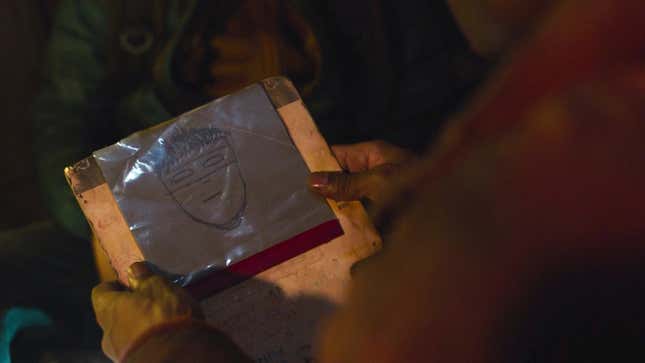
Henry goes to comfort his little brother, who has drawn a masked superhero on his pad. “Super Sam,” Henry signs. Sam is understandably afraid, and Henry tries to reassure him that they’re safe here. “There is one problem, though,” he says. “This place? Is ugly.” He then breaks out the big bag of art supplies that Sam uses to decorate the space. It’s an endearing moment, with Henry creating for his younger brother an alternate reality in which the only real problem facing them is the drabness of their surroundings, and not the army hunting them right outside.
The birth of Super Sam
We skip ahead ten days, to find the attic filled with images of Super Sam blasting evil FEDRA officers and flying protectively over the city. But now, a real problem is bearing down on them: they’re almost out of food, and Sam is hungry. Edelstein’s been gone a whole day, and their hopes rest on him returning with some. We already know he’s not coming back. And yet right out the window, Henry can see resistance officers scouring the city, making leaving a dangerous proposition. They’re in a tight spot.
Finally, Henry has to face the fact that Edelstein isn’t returning. He tells Sam that he’s studied the patterns of the resistance patrols and can guide them to safety. When Sam asks if they killed Edelstein, Henry is honest and says they probably did. Sam clings to Henry for a long time after that. He’s a child growing up in a world in which nothing is ever safe or assured. He must be terrified.
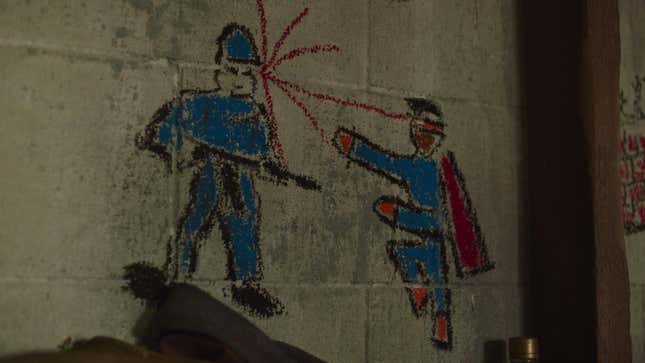
As he holds his brother and looks at the art decorating the walls, Henry has a flash of inspiration. He tells Sam to close his eyes, and paints a red mask on his face, just like the one Sam’s alter ego sports in all the drawings. Seeing it reflected in his brother’s knife, Sam nods with satisfaction. He’s ready to face the world.
They don’t get far, though. Just as they’re about to leave the building, a gunfight breaks out outside. It’s Joel and Ellie’s unceremonious arrival in Kansas City, and Henry observes as Joel kills the hunters attacking him. We see the wheels in his head turning. “New plan,” he tells his brother.
Meeting Joel and Ellie
Now we come back to the moment that concluded episode four, when the paths of these two duos intersect. Henry’s obviously been keeping an eye on Joel since earlier in the day, and he’s tracked him and Ellie to the apartment building where they’ve crashed for the night.
Joel isn’t exactly thrilled about waking up to the reality of being held at gunpoint, but soon they agree to a tentative truce, and Henry introduces himself as “the most wanted man in Kansas City.”
Over a quiet meal, Ellie asks Sam how old he is, and with Henry acting as an interpreter between them, he responds that he’s eight. (In the game, Sam is closer to Ellie’s age of 14, but him being younger here makes me even more sympathetic to how overwhelming and terrifying his experience of the world must be.) Joel, being Joel, says dryly that they successfully ate together and didn’t kill each other, so they should call it a win and move on. But Henry has a card up his sleeve. “I’m betting that y’all came up here to get a view of the city and plan a way out,” he says. “And when the sun’s up, I’ll show you one.”
“Welcome to Killa City”
The next morning, Henry provides Joel (and us) with some additional context for what went down in Kansas City. Looking out at the city, Joel is struck by the lack of FEDRA, especially since he’d always heard that KC FEDRA ruled with an iron fist. Henry confirms the rumors. “Raped and tortured and murdered people for 20 years,” he says. So if Henry wasn’t part of this monstrous FEDRA, Joel wonders, what, then, was he? When Henry replies that he was something even worse, “a collaborator,” Joel protests and says he doesn’t work with rats. Henry insists that today, he doesn’t have much choice, “‘cause I live here and you don’t.” They need each other, Henry argues. Only he knows where to go, and only Joel has the capacity for violence to get them out alive.
This is all quite different from the game, in which Henry and Sam weren’t native to Pittsburgh (where the game’s version of this storyline takes place), but had just come there from Hartford, Connecticut in search of supplies. They had no connection to the resistance that had risen up in Pittsburgh, but just happened to be people who could help Joel and Ellie get out of the city. In both stories, though, Sam lets us see new sides of Ellie by giving her a fellow kid to geek out with and play with, and having another duo traveling with them for a while illuminates Joel’s growing attachment to Ellie and his sense of himself as her protector, no longer just out of obligation but increasingly out of genuine care and concern.
As the two talk, the sound of kids laughing can be heard nearby. Ellie is showing Sam her tattered book of jokes, and a genuine smile stretches across Henry’s face. “Haven’t heard that in a long time,” he says, mirroring a moment from the game in which Ellie and Sam playfully eat blueberries together and Henry says it’s been a long time since he saw Sam crack a smile.
Perhaps counterintuitively, I find these moments of fleeting happiness among the most devastating in both the game and the show, because I know how things end for Henry and Sam. Their fate is so awful, so bleak, that it makes me think back to Ellie’s question to Joel in episode four: “If you don’t think there’s hope for the world, why bother going on?” I’m once again glad that the TV series at least offered us the reprieve of Bill and Frank, giving us one vision of lives lived well and with meaning, to temper how relentlessly hopeless it all gets for a while.
Henry’s plan
Henry sketches a map of the area showing how Kathleen’s forces have the area on lock. Still, there is a way out, he insists. Sam sits nearby sketching, but Henry doesn’t want him left out of the conversation. “How do we get across?” he signs at his brother. Sam writes intently on his pad for a moment, then holds it up. “TUNNELS.” It’s a great plan, but there’s a huge catch. Kansas City may seem strangely lacking in Infected, but there’s a reason for that. “FEDRA drove them underground 15 years ago,” Henry says. He insists, though, that FEDRA cleaned out the tunnels three years ago. Just what that means or how exactly they did that remains ominously unspoken, almost as if the show’s writers want to plant a seed in our minds about it. Nah, I’m sure it won’t come up again. Henry admits that the plan is “dicey-as-fuck,” but it’s also the only plan they’ve got.
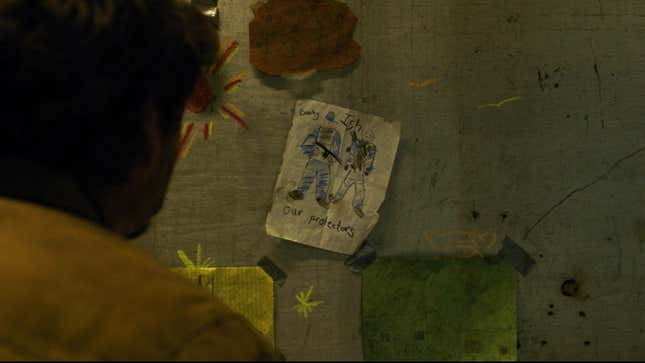
As they head down into the tunnels, Joel tells Ellie to get her gun out, and it looks like Ellie has to suppress a smile as he’s finally fully shifted from relentlessly denying her a gun to asking her to be ready to use one. However, the tunnels do indeed appear empty, vastly, surprisingly empty, stretching hollowly before them as far as the eye can see. Joel stays on guard but nothing is stirring in these subterranean passageways, and at last they come to a place that looks quite different, where the walls are decorated with the kinds of colorful drawings you might see at a preschool. Passing through a door, they find an abandoned place where people—adults and children—clearly once lived. Amidst all the details—the toys, the posted signs laying out rules, all the other signs of life—one thing stands out: a child’s drawing of two smiling men in body armor, with rifles, labeled “our protectors,” Danny and Ish. And here’s where we come to the episode’s great little nod to the game.
Who is Ish?
First, a little background. In the game, Joel and Ellie’s journey with Henry and Sam briefly takes them along a beach where you can enter a battered old boat and find a note. (Considering that this is near Pittsburgh, that probably makes about as much sense as the beginning of episode two being set “10 miles west of Boston.”) The note is signed by someone named Ish (perhaps a reference to Moby Dick’s sea-faring narrator Ishmael) and details how, after spending some time at sea to hide from the outbreak, he eventually found himself running low on supplies and his boat in disrepair, and returned to shore to take his chances with humanity again.
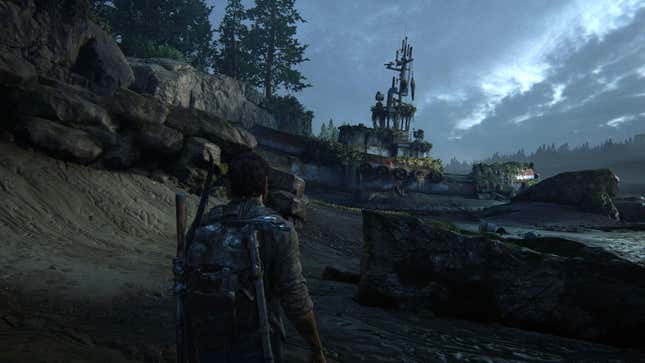
From there, you head into nearby sewers, where you can find a small area where Ish lived alone for some time after coming ashore. A note of his you can find there mentions that he met some people who had kids with them and who did not want to shoot him on sight. “Shocking I know,” he comments. The encounter puts the idea in his head that maybe it’s better for him to try trusting other people than it is to continue living alone. “What’s the point of surviving if you don’t have someone to laugh at your corny jokes?” his note reads, a question that cuts to the heart of The Last of Us’ themes. “Tomorrow, I’m going in search of them.”
Soon, you come to a place that’s very much like the one the party finds in the TV series, where Ish lived with other adults and children. In fact, the very same drawing of Ish and another adult named Danny that we see in the show is seen here in the game. Unfortunately, environmental clues also tell us that at some point, infected did get into the settlement, and the results were tragic, with another adult named Kyle and a few children getting trapped in a room by infected, and Kyle killing the children himself to spare them an even worse fate. Another note that you can find in the suburbs upon leaving the sewers reveals that he and a woman named Susan got out, but it’s excruciating to read. “She lost her children,” it says, “and I have no clue what to say to her.”
It concludes with Ish writing that every part of his being wants to give up, but he just can’t. “I’ve seen that we’re still capable of good. We can make it. I have to stay strong… for her.” What happened to him after that remains unknown.
Very often, I feel that Easter eggs are kind of exclusionary. They wink and nod to those people who are in the know, letting those viewers perhaps feel smug about picking up on cool details that fly over the rest of the audience’s heads. This drawing on the wall, though, works either way, I think. If you haven’t played the game, it offers some insight into what life was like here in this underground settlement at one time, and if you do know it from the game, it opens up a whole other narrative to you. A tragedy nested within a tragedy. Right about now, The Last of Us just feels like tragedies all the way down.
Savage Starlight
Sam finds a copy of a Savage Starlight comic, which in the game serves as a collectible Joel can find throughout and give to Ellie. Ellie is immediately stoked at Sam’s find, and the two of them bond over their shared enthusiasm for the series, trading details about which issues they each have. One particularly sweet moment sees Ellie quoting the hero’s catchphrase of “Endure and survive” and Sam teaching it to her in ASL. God, I want these kids to make it. (Around this same stretch of the game, Ellie will occasionally say “Endure and survive” after Joel has finished taking out a group of enemies and it seems like the two are safe for the time being.)
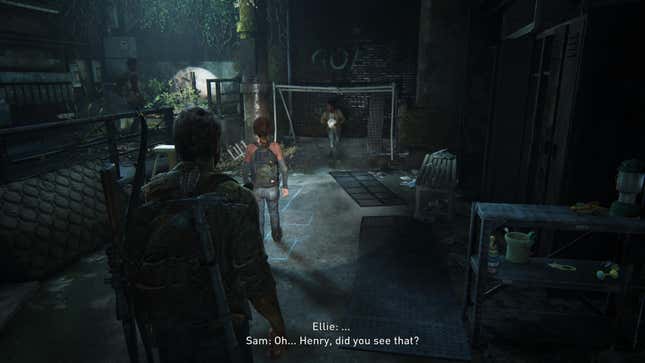
Other moments here are direct nods to the game, like one when Ellie and Sam play soccer using a makeshift goal painted on the wall. However, a conversation between Joel and Henry that sheds further light on his connection to Kathleen is totally new. Joel apologizes for having called Henry a rat before, saying that if Henry did what he did for Sam’s sake, he understands. Henry finally tells Joel exactly what it is he did do, and why. He paints a picture of a great man, one who “was never afraid, never selfish, and he was always forgiving.” He’s clearly talking about Kathleen’s brother, who he wanted to follow, and would have followed, if only.
“But Sam, he got sick. Leukemia.” And wouldn’t you know it, FEDRA had control of the very limited supply of the only drug that could treat him. So he made a deal, and gave FEDRA what they wanted. He’s still wracked with guilt about it, but the world presented him with an impossible choice that he never should have had to make in the first place. Rather than offer any words of comfort or understanding, though, Joel just says “We’ve waited long enough.” It’s time to move on.
Kathleen and Michael
We find Kathleen standing in her childhood bedroom, in a clearly abandoned house. And as she tells Perry about her brother—who we learn here was named Michael—and how he’d always comfort her during thunderstorms when they were kids, all I could think was, “Oh my god, shut up.” She’s the type of person who’s so convinced that her pain and suffering matter so much more than everyone else’s, that hunting down Henry is good and righteous because he took her brother from her, even though he only did it because it was the only way to save his own brother. Of course her pain and grief are real, but the extremes she’s going to in her pursuit of Henry make me lose all sympathy for her. She’s an egomaniac.
In fact, even her own brother’s wishes don’t matter to her, much as she might pretend to be honoring his life or his memory in this act. “He was so beautiful,” she says about Michael. “I’m not. I never was.” She knows Michael would want her to forgive Henry. He outright told her that when FEDRA had him locked up right before they killed him. But her pain is just too important to her for her to do that. And Perry is happy to validate her worst impulses. “Your brother was a great man. We all loved him,” he says. “But he didn’t change anything. You did. We’re with you.” Thanks, Perry. Big help. I’m sure that won’t encourage Kathleen to do something even more selfish and reckless than all the things she’s already done.
Sniper on the street
Joel and the gang emerge outside of Kathleen’s territory in a suburban neighborhood that seems safe at first glance, and the mood is relatively light as Ellie begins does her best Joel impression and encourages Henry and Sam to come with them to Wyoming. (In the game, Henry and Sam are already planning to track down the Fireflies, but here, they just want to get out of Kansas City for starters.) The calm is broken, however, when a sniper bullet strikes the ground near them and they dash behind a wrecked car for cover, plunging us into a sequence that owes a lot to the game.
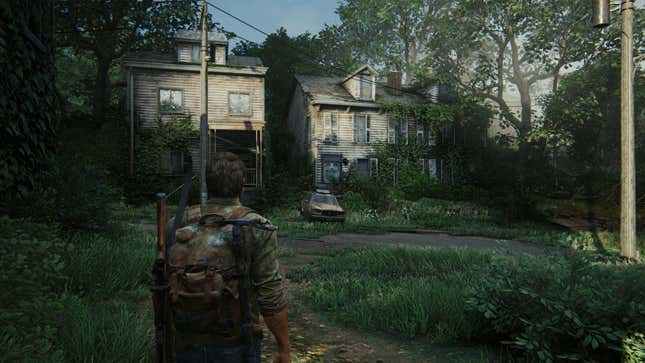
Sniper bullets continue to rain down on them, and just as in the game, Joel opts to sneak around and try to come at the sniper from behind. In the game, though, what you find in the sniper’s perch is a young man with a knife, prompting a grisly button-mashing sequence in which you ultimately turn the blade on the man and stab him with it repeatedly. Here, Joel finds an older man, one of Kathleen’s faithful, who refuses Joel’s plea to just drop the gun, instead cementing his own death by turning the gun on Joel. Just then, Kathleen’s voice crackles over a radio. “Hold them where they are,” she says. “We’re almost there.”
“It ends the way it ends”
In the game, the one repurposed Humvee the Pittsburgh resistance claimed from FEDRA soon arrives, but here, Kathleen’s forces are much more well-equipped, and a number of vehicles are soon barreling down on Ellie, Henry, and Sam. Just as in the game, Joel provides cover with the sniper rifle, and here he takes out the driver of the truck leading the charge, sending it careening into a nearby house where it promptly explodes.
Read More: HBO’s The Last Of Us Just Nailed One Of The Game’s Best Moments
Still, Kathleen’s forces close in. Perry sends men after Joel, and Kathleen begins to address Henry, revealing that her hypocrisy and self-importance know no bounds. “I know why you did what you did,” she says, “but did you ever stop to think that maybe [Sam] was supposed to die?” When Henry protests that Sam is just a kid, she replies that kids die “all the time.” That may be true, but it doesn’t change the fact that by her moral calculus, Sam’s life should have been totally disregarded, while Michael’s life should have been prioritized above all. In one truly staggering moment of cognitive dissonance, she says “You think the whole world revolves around him?” as if she isn’t acting like the whole world revolves around her quest for vengeance.
Finally, Henry emerges. “It ends the way it ends,” Kathleen says as she raises her gun to kill him. This calls for a deus ex machina, baby!
Something wicked this way bloats
Just then, the truck nearby teeters and falls as the earth beneath it yawns open, and an absolute tidal wave of speedy infected rise up out of it, a kind of cosmic retribution for Kathleen’s hubris. (A mob of infected also bear down on the group during this sequence in the game, but it’s nothing like this.) Huh, I guess FEDRA didn’t really deal with the infected problem after all, they just tried to brush it aside. Showrunner Craig Mazin knows a thing or two about writing stories where institutions do that, I guess, having worked on Chernobyl as well.
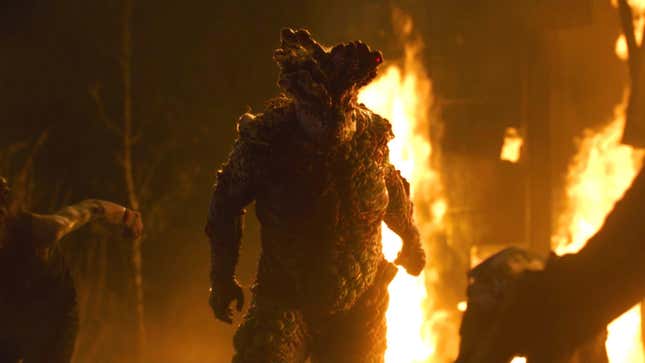
Suddenly Kathleen’s considerable show of force feels quite impotent, as the assault rifles have little effect in stemming the tide of death. Joel does the best he can to cover his allies amidst the chaos, but Ellie gets separated from Henry and Sam and climbs into an old SUV. Just then, a guttural growl unlike any sound we’ve heard an infected make thus far is heard, and a very different beast emerges from the sinkhole, a formidable, fungus-encrusted chonker of an infected called a bloater, a boss-type enemy from the game. Kathleen’s forces don’t have any of the molotov cocktails or nail bombs I usually use to take these bad boys down, so I think they’re pretty much fucked.
Read More: What Was That Giant Infected In Episode 5 Of The Last Of Us?
Perry peppers the thing with bullets but they clearly have little effect aside from making it mad. As it bears down on him, he urges Kathleen to get to cover, then turns to face his fate, which is having his head ripped clean off in a death consistent with one of the game’s most horrifying death animations.
Meanwhile, Ellie has a guest in her little SUV sanctuary: a creepy infected who was also a teenage girl before getting turned. Ellie heads out onto the street where she sees Henry and Sam pinned down by infected under a nearby car. With Joel’s help and a few stabs of her trusty switchblade—her signature weapon in the game—she gets them out and they make a run for it. Kathleen stops them yet again, but her success is short-lived, as a young infected—who I think but I’m not certain is the same one that chased Ellie out of the vehicle a moment before—leaps on her and absolutely shreds her to bits. It ends the way it ends.
As Joel leads them away from the chaos, we see the mob of infected, including the bloater, lurching its way back toward Kansas City. Nice going, Kathleen. Great job.
“I’m scared of ending up alone”
Joel and the gang have found shelter in an old motel for the night. In the game, there’s a nice moment here where Henry presses Joel for details about the time Joel and his brother Tommy rode Harley-Davidsons on a cross-country trip. That detail’s been omitted from the show, but the general arc of how things play out here is pretty similar.
“You think they’ll be okay?” Henry asks about the kids as they read Savage Starlight together in the next room, and Joel, in his own taciturn way, offers a kind of comfort to Henry, as a fellow protector of a young charge. It’s easier when you’re a kid, he says. “You don’t have anybody else relying on you. That’s the hard part.” Then comes a bit of playful meta-dialogue as Joel says, “What’s that comic book say? ‘Endure and survive’?” “Endure and survive,” Henry says. Then, after a moment: “That shit’s redundant.” “Yeah, it’s not great,” Joel agrees.
And now, as Ellie jokingly predicted earlier, Joel does indeed invite Henry and Sam to join them on the trip to Wyoming. It’s another one of those seemingly pleasant, hopeful moments that I find all the more painful because we’ll never get to see what might have come to pass if only the world they lived in were a little less dangerous and cruel. “Yeah, I think it’d be nice for Sam to have a friend,” Henry says. “New day, new start.” Okay, writers. Now you’re deliberately twisting the knife, jeeze.
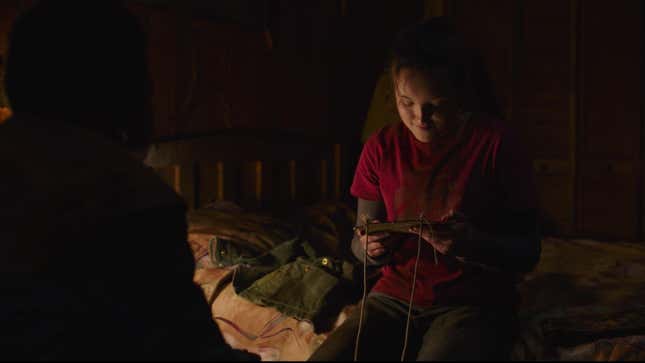
Though Henry urges Sam to get some sleep, he and Ellie stay up for a bit, Ellie doing different voices as she reads Savage Starlight aloud. But Sam is preoccupied. “Are you ever scared?” he writes on his pad, a question he effectively asks her aloud in the game. (“How is it that you’re never scared?”) Just like in the game, Ellie first jokes that she’s afraid of scorpions, before admitting that what really scares her is the possibility of ending up alone.
In the game, when Ellie asks Sam what he’s scared of, he brings up infected. “What if the people are still inside?” he asks, and it’s the first time that the game directly engages with a terrifying idea that the show brings up early on: whether the person an infected once was remains somehow present and aware, even as they lose all control over their body. The game’s Ellie dismisses the idea, saying “that person is not in there anymore.” Her counterpart in the show, however, seems a bit more troubled by the idea.
The game’s Sam keeps his bite a secret, but in the show, after asking Ellie, “If you turn into a monster, is it still you inside?” he lifts the leg of his jeans to show her the nasty wound. Ellie here does something strange and sweet and hopeless: she cuts her own hand to draw blood and press it into the bite, telling Sam, “My blood is medicine.” If only it were that simple.
What happens the next morning is so awful, I don’t even want to bring myself to write it. If you’re reading this recap, you probably know, and if you don’t, I think you can guess.
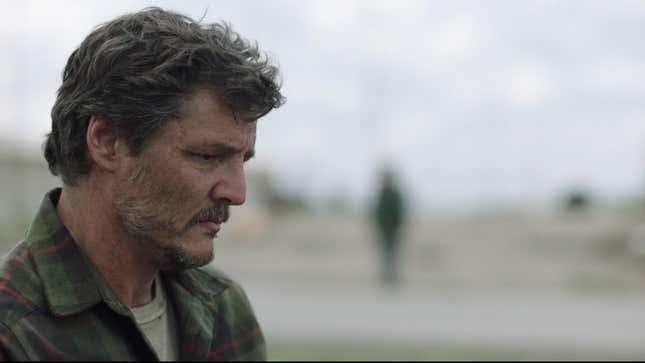
As they bury the bodies near the motel, Ellie sets Sam’s sketchpad atop his grave. On it, she’s written the words “I’m sorry.” She’s withdrawn and just wants to leave. You have to wonder if she isn’t starting to give up on the world herself. Meanwhile, as he looks at the message she’s written, Joel seems, if anything, more committed to Ellie than ever. Something in his face suggests that he wants to spare her an existence made up of this kind of relentless suffering. He collects his gear, picks up the sniper rifle (new weapon unlocked!), and they head west.
As I said above, I find this week’s episode excruciating, so miserable in its outcome that in retrospect, even the few bright spots make it more agonizing. I don’t know about you but good lord, after all this, I sure hope these two catch a bit of a break soon.